Search Results
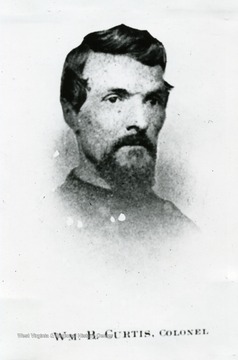
- IDNO:
- 039053
- Title:
- Colonel William B. Curtis, Twelfth West Virginia Regiment
- Description:
- Commander of the 12th West Virginia Infantry Regiment, Army of the Potomac. Curtis was brevetted Brigadier General in recognition of his part in the attack on Fort Gregg of the Petersburg siege line, April 2, 1965.

- IDNO:
- 039058
- Title:
- General George McClellan and Staff
- Date:
- 1862
- Description:
- A carte de visite image of Union General George B. McClellan and his staff, left to right: Captain Clark, General McClellan striking a napoleonic pose, Captain Van Vliet and Major Barry. Information printed on the bottom of image: "Entered according to Act of Congress in the year 1862, by M.B. Brady, in the Clerk's office of the District Court of the District of Columbia."
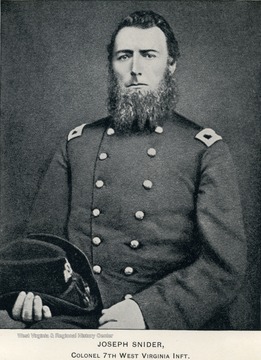
- IDNO:
- 039060
- Title:
- Colonel Joseph Snider, Seventh West Virginia Infantry
- Description:
- Snider, from Monongalia County, W. Va. took command of the 7th West Virginia Regiment in August, 1862. He was seriously wounded at Fredericksburg, December, 1862.
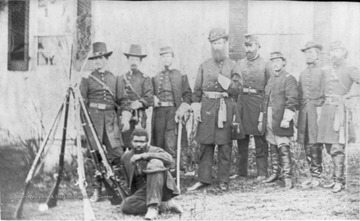
- IDNO:
- 039078
- Title:
- Union General John Geary and Staff, Harpers Ferry, Va. (W. Va. )
- Date:
- 1861
- Description:
- Geary commanded the 28th Pennsylvania Regiment and several other companies in the Harpers Ferry and Sandy Hook areas during the Union Army occupation in 1861. Identified officers are, L to R: 3rd from left, Captain Thomas Hollingsworth; 4th, General John Geary; 5th, Major Hector Tyndale.

- IDNO:
- 039089
- Title:
- Union General John Fremont
- Date:
- ca.1861
- Description:
- Fremont was given command of the Mountain Department in Western Virginia in early 1862. He resign his post in the Fall of 1862.
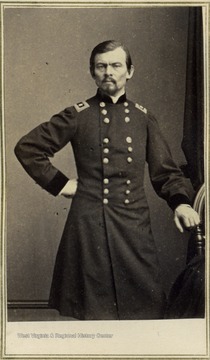
- IDNO:
- 039090
- Title:
- Union General Franz Sigel
- Date:
- ca. 1862
- Description:
- Sigel commanded the Federal forces in the Shenandoah Valley during the Spring of 1864, with many West Virginia units under him. After his defeat at New Market, Virginia, Sigel was reassigned to the Department of West Virginia, protecting the Baltimore and Ohio Railroad.
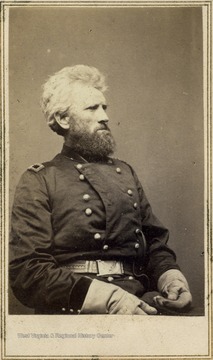
- IDNO:
- 039091
- Title:
- Union General Robert H. Milroy
- Date:
- ca. 1862
- Description:
- Milroy commanded the Cheat Mountain District in 1861, losing his first battle at Camp Allegheny. He surprised Stonewall Jackson at the Battle of McDowell in early May of 1862, inflicting heavy casualties.
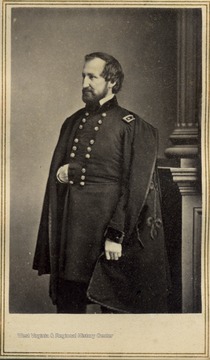
- IDNO:
- 039092
- Title:
- Union General William S. Rosecrans
- Date:
- ca.1862
- Description:
- Rosecrans was responsible for several Union victories including the Battle of Rich Mountain during the Summer of 1861 in Randolph County, Virginia (West Virginia).
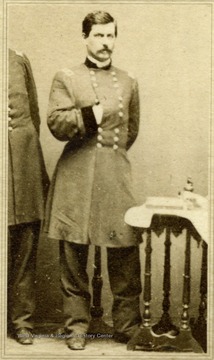
- IDNO:
- 039106
- Title:
- Union General George McClellan
- Date:
- ca. 1862
- Description:
- McClellan commanded Federal troops in Western Virginia at the outbreak of the Civil War. After an initial victory at Rich Mountain and the Union's embarrassing defeat at Manassas, McClellan was given command of the Union Army of the Potomac.
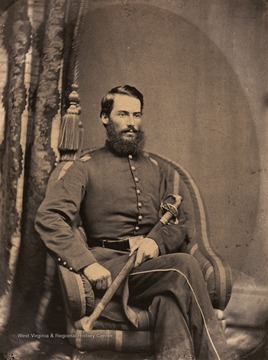
- IDNO:
- 039109
- Title:
- Major Fabricius A. Cather, 1st West Virginia Cavalry from Flemington, Taylor County, W. Va.
- Date:
- ca. 1864
- Description:
- Cather fought in several battles in Western (West) Virginia, the Shenandoah Valley, at Petersburg and on Lee's Retreat. He served under McClellan in 1861, David Hunter, 1864 and Sheridan, 1864-65. Cather was also under the division command of George Custer, riding with Custer into many battles in 1864-65.

- IDNO:
- 047276
- Title:
- Portrait of Major Shriver Moore
- Date:
- ca. 1891-1895
- Description:
- Born in Green County, Pennsylvania, Moore was the son of John W. and Mazie Moore. The family came to West Virginia in 1847 and settled on a large farm near Matamoras Station, where he later married Adaline W. Hanes in 1856. The couple bore nine children, seven of whom survived. After Hanes death in 1915, Moore re-married with Sallie A. Rarick in 1902.In 1862, Moore volunteered as a Union soldier in the 14th Regiment, Company E., West Virginia Infantry and was honorably discharged at the close of the war, having received a severe wound in the right hand.He later served his country as a member of the county court for six years and was also an overseer of the poor in Lincoln District (which included Sistersville) for many years.He died of bronchial trouble on his family farm at Pursely Creek on November 24, 1915 at the age of 81.
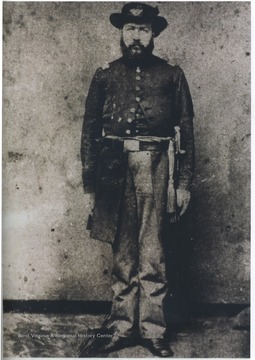
- IDNO:
- 047277
- Title:
- Portrait of Major Shriver Moore
- Date:
- ca. 1891-1895
- Description:
- Born in Green County, Pennsylvania, Moore was the son of John W. and Mazie Moore. The family came to West Virginia in 1847 and settled on a large farm near Matamoras Station, where he later married Adaline W. Hanes in 1856. The couple bore nine children, seven of whom survived. After Hanes death in 1915, Moore re-married with Sallie A. Rarick in 1902.In 1862, Moore volunteered as a Union soldier in the 14th Regiment, Company E., West Virginia Infantry and was honorably discharged at the close of the war, having received a severe wound in the right hand.He later served his country as a member of the county court for six years and was also an overseer of the poor in Lincoln District (which included Sistersville) for many years.He died on his family farm at Pursely Creek on November 24, 1915 at the age of 81.











